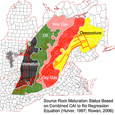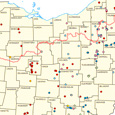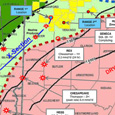Distrust of Biz, Gov’t Triggers Shale Stress
Friday, May 3, 2013
PITTSBURGH — Pennsylvania residents living near unconventional natural gas developments using hydraulic fracturing, known by the slang term “fracking,” attribute several dozen health concerns and stressors to the Marcellus Shale developments in their area, according to a long-term analysis by University of Pittsburgh Graduate School of Public Health researchers.
Reported health impacts persist and increase over time, even after the initial drilling activity subsides, researchers noted.
The study was only of individuals self-reported health claims, and did not include clinical examinations of the participants’ physical health nor any environmental tests.
Stress and frustration
The most commonly cited concern was stress, which 76 percent of participants said they’d experienced.
Among the leading causes of stress reported by the participants were feelings of being taken advantage of, having their concerns and complaints ignored, and being denied information or misled.
“Many of these stressors can be addressed immediately by the gas drilling industry and by government,” said senior author Bernard Goldstein, M.D., emeritus professor and former dean of Pitt Public Health.
“Scientific literature shows that if people do not trust companies doing work in their communities, or believe that the government is misleading them, there is a heightened perception of risk,” said Goldstein, also a member of the National Academies’ committees to investigate shale gas drilling in the U.S. and Canada.
Social fabric ripped
“Community disruption and psychosocial stress have been well-documented as a result of environmental issues like oil spills and superfund sites. A strong response by the Pennsylvania Department of Health to address concerns about health impacts of hydrofracturing could reduce observed stress and resulting symptoms,” he said.
From May through October 2010, members of Pitt Public Health’s Center for Healthy Environments and Communities conducted in-depth interviews with 33 people concerned about fracking in their communities. Three- quarters of the residents resided in five of the seven most heavily drilled counties in Pennsylvania.
Follow-up interviews were conducted from January through April 2012 and included 20 of the initial 33 participants. The remainder could not be reached or declined to participate.
Real or imagined
“Our study shows that perceptions of health may be affected by fracking regardless of whether this health impact is due to direct exposure to chemical and physical agents resulting from drilling or to the psychosocial stressors of living near drilling activity,” said lead author Kyle Ferrar, a doctoral student at Pitt Public Health.
“Comprehensive epidemiological studies of all potential adverse consequences of fracking need to be performed, and they should include a close look at psychosocial symptoms, including stress, which cause very real health complications.”
Participants reported 59 unique health issues that they attributed to Marcellus Shale development. In addition to stress, these perceived health issues included rashes, headaches, shortness of breath, nausea and sore throats.





This is a distorted version of facts and findings. Chickens, horses, dogs, cats, many wild animals and birds are not dying of perceived ills. It is very stressful to see the destruction, the disgusting flaring and leukemia etc in humans is stressful not caused by stress. Public relations is in the service of big money not human rights and health. Acrylonitrile is a carcinogen and used to coat sand and sold to us by our friends in China..in water samples over a large area of WV and PA…traveled in the water table. there is no safe drinking water in parts of Texas…drilling chemicals like hexavalent chrome, perchlorate etc.